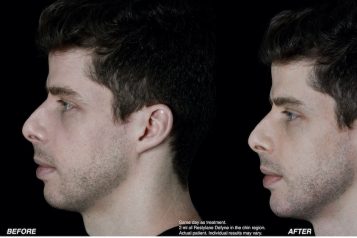Dr. Michele S. Green M.D., FAAD., is a Board-Certified Cosmetic Dermatologist, Fellow of the American Academy of Dermatology, and has been an international leader in cosmetic dermatology for over 25 years. Upper East Side patients and those from the surrounding areas of New York City flock to her practice for a variety of cosmetic dermatology treatments. A graduate from Yale University, with an MD from Mount Sinai Medical School in NYC, Dr. Green treats some of the most discerning, demanding women and men in the world, with issues ranging from premature skin aging to hyperpigmentation, rosacea, acne, skin laxity, hair loss, and sun damage.
Haute Beauty Expert Dr. Michele Green explains how stress causes hair loss while providing several suitable treatment options.
 Photo Credit: Courtesy of Dr. GreenCan stress cause hair loss?
Photo Credit: Courtesy of Dr. GreenCan stress cause hair loss?
There are three types of hair loss that are associated with stress, they are Telogen effluvium, Trichotillomania, and Alopecia Areata. With Telogen effluvium, stress causes the hair follicles to become dormant (enters a resting process), and after three months in the resting period the hair falls out. This stress results in reduced hair growth and thinning. The stressor event, such as a fever, surgery, or other illness, can induce between 20 to 50 percent of scalp hairs to transition into the telogen phase before the hair falls out. Alopecia Areata is an autoimmune condition where the immune system attacks its own hair follicles. Trichotillomania is an uncontrolled and impulsive disorder of pulling one’s hair which results in the hair being pulled from the follicle. It can take six weeks to six months from a stressful event for hair loss to occur. Stress-related hair loss can be permanent if it’s not treated in its early stages. In some cases, there can also be scar-related issues such as cicatricial alopecia – where damaged skin may impact hair growth, or prevent the regrowth of new hair.
If you’ve noticed that your hair is thinning or excessively shedding it is important to contact an expert in hair loss, like myself, immediately. Getting treatment for hair loss in its early stages, before bald spots appear, can help minimize overall hair loss and increase the odds of a treatment’s efficacy.
Treatment Options: Hair Loss Treatment in NYC
PRP Treatment for male and female patients
PRP is a non-invasive injectable treatment for hair loss that uses the patient’s own blood. A small blood sample is taken from the patient in a special tube which is then placed in a centrifuge and spun for ten minutes to separate the plasma from red blood cells. The separated plasma contains the PRP (platelet-rich plasma) which is injected into the scalp to treat hair loss. The plasma that is separated during this process contains growth factors which are a mixture of proteins and cytokines. The proteins and cytokines both play an important role in stimulating the hair follicles to generate hair growth.
PRP is the only non-invasive procedure available at this time for hair loss. In addition to PRP, there are several alternative options available for treating male pattern baldness. Oral medications such as Propecia (finasteride), along with topical treatments such as Minoxidil (Rogaine) can help increase hair density as well. Dr. Green was one of the first dermatologists in NYC to incorporate PRP injections for hair loss, yielding amazing results for both male and female patients.
Finasteride
Finasteride (Propecia) is an FDA-approved drug for the treatment of androgenetic alopecia (male-patterned baldness). DHT (dihydrotestosterone) is a male androgenic hormone responsible for shrinking the hair follicles. Propecia is a 5-alpha-reductase inhibitor, which helps reduce hair loss by blocking the action of testosterone into dihydrotestosterone (DHT). This shrinkage of the hair follicles ultimately leads to hair loss and eventually baldness. Propecia is effective in treating both men and post-menopausal women with hair loss. Propecia is a lower-dose version of the medication Prosper, which is used to treat male prostate hypertrophy. Finasteride works by lowering the DHT levels in the body, slows hair loss, and promotes new hair growth. Dutasteride, marketed as Avodart, while approved to treat prostate hypertrophy, is used off-label to treat hair loss.
Hydrafacial Keravive Scalp Treatment NYC
I have been using Hydrafacial technology to help rejuvenate the skin. Now, the Hydrafacial technology has created Keravive, which is a unique office 3-step office procedure to cleanse, stimulate, and hydrate the scalp. Keravive removes impurities and dead skin cells from the hair follicles and replaces vital nutrients, such as antioxidants, peptides, and hyaluronic acid, into the scalp. Hydrafacial Keravive in-office treatment is recommended once a month for three months in conjunction with the Keravive Complex spray for healthier-looking, fuller, hair. The effects of Hydrafacial Keravive are both immediate and long-lasting.
Spironolactone or Oral Contraceptives
Many women suffer from hormonal fluctuations, which can lead to hair thinning and overall hair loss. Dr. Green will do a thorough examination of your hair, scalp, blood, and pattern of hair loss, to determine what is the cause of your hair loss. If the hair loss is associated with a hormonal problem, birth control pills or Spironolactone, combined with PRP or topical treatments, can restore this type of hair loss.
LaserCap for hair loss
The LaserCap is a highly effective prescription-strength laser therapy, which is FDA approved, for hair regrowth in both men and women. The LaserCap re-energizes inactive hair follicles using Low-Level-Laser Therapy (LLLT), which is a safe, and natural, proven way to increase hair growth. It is used three times a week, for 30 minutes. It is particularly effective as a maintenance device for hair growth and is a drug-free alternative for patients who do not want to take oral medications.
Minoxidil
Minoxidil (Rogaine) is an FDA-approved topical treatment for hair loss. Minoxidil comes both as a solution or foam base which needs to be applied to the scalp at bedtime. Minoxidil can be used to compliment PRP hair treatments and can be used long-term to sustain the results achieved from PRP.
Nutrafol
Nutrafol is a proprietary blend of vitamins clinically proven to restore hair growth. Nutrafol comes both as an oral vitamin supplement in addition to a topical vitamin enriched solution to stimulate hair growth. The vitamin and nutrient formulation in Nutrafol such as saw palmetto prevents the conversion of the male androgen hormones into DHT (dihydrotestosterone) which is responsible for baldness.
 Photo Credit: Courtesy of Dr. GreenDr. Michele Green is an expert in hair loss, whether it be from stress, genetics, or hormonal reasons. A thorough hair loss consultation with Dr. Green will help to ascertain the cause of your hair loss to provide you with the best treatment. Whether it be topical solutions, lasers, PRP, or medications, Dr. Green will customize your hair loss treatment to create a solution to your hair thinning today. Consistently voted the best dermatologist in NYC by Castle Connolly, New York Magazine, and the NY Times, Dr. Green will help you get superior results. With over two decades of experience in cosmetic dermatology in NYC, an expert in Botox, lasers, cosmetic injections, and hair loss, Dr. Green will help give you the best cosmetic results.
Photo Credit: Courtesy of Dr. GreenDr. Michele Green is an expert in hair loss, whether it be from stress, genetics, or hormonal reasons. A thorough hair loss consultation with Dr. Green will help to ascertain the cause of your hair loss to provide you with the best treatment. Whether it be topical solutions, lasers, PRP, or medications, Dr. Green will customize your hair loss treatment to create a solution to your hair thinning today. Consistently voted the best dermatologist in NYC by Castle Connolly, New York Magazine, and the NY Times, Dr. Green will help you get superior results. With over two decades of experience in cosmetic dermatology in NYC, an expert in Botox, lasers, cosmetic injections, and hair loss, Dr. Green will help give you the best cosmetic results.
For more information, visit Dr. Brian A. Levine's social media:

























